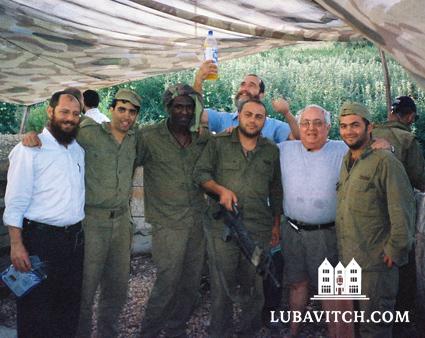With putty in his ears to protect them from the roaring report of mortar fire, Morton Friedman of Wilmette, IL, supported Israel during the war from the frontlines.
When the war started, Friedman, a former Chief of the Criminal Division of the Cook County State Attorney’s Office, called Rabbi Dovid Flinkenstein at Chai Center-Chabad of Wilmette. He wanted to volunteer in Israel, and not just volunteer somewhere in Israel, which would have been enough, but in the north. “I had trouble conceptualizing why a Diaspora Jew’s blood is more worthy of protection than an Israeli Jew’s,” said Friedman.
Rabbi Flinkenstein’s calls to Rabbi Israel Brod of Chabad of Israel, linked Friedman up with Chabad of Kiryat Shmona’s Rabbi Yigal Tzipori. “Mort became our agent of good,” said Rabbi Flinkenstein. “It is just amazing how Morton embodied the idea that one person can actually make a difference. That’s what the Rebbe taught us. That’s Morton, that’s his neshama,” his soul.
Forty-eight hours later, Friedman boarded a mostly empty El Al flight. Supporting the troops, a popular throwaway phrase in the United States, became part of Friedman’s daily schedule. Walking among the armored personnel carriers and tanks, three hundred feet from Israel’s border with Lebanon, at Metula, Friedman stuck out among the Israeli soldiers. They were barely out of their teens. Friedman’s retired. They were cloaked in army khakis and helmets, he in a wash’n’wear nylon shirt, shorts, sandals and a safari hat. But Friedman was accepted as one of the family. Simply because he was Jewish, and more so because he was just a guy from Chicago who came to Israel when he could have passively participated in the war via CNN. “That acceptance was just an extraordinary feeling,” said Friedman. “I have always enjoyed being a Jew, but it had a different intensity. It was a realization of what a great and wonderful gift it is to be a Jew.”
“Kol Hakavod,” Hebrew for “way to go, man,” was the response of soldier and civilian alike when they discovered Friedman’s American roots. To that Friedman would reply, “Thank you for making an Israel for me to come to.”
Friedman called Kiryat Shmona his home base during his stay. The town in northern Israel had basically emptied of everyone who had a place to go, leaving the poorest of the poor, the infirm and others stranded without resources, in bomb shelters. Friedman, a hands-on guy who’s always willing to hang up shelves, nail in pictures, and rescue dislocated sinks at Chabad, didn’t hold out for glam jobs. He helped cook 1,200 meals at a Chabad soup kitchen, all in one day. He delivered food to families living in bomb shelters. He carried out the garbage, washed out tub-sized pots after meal prep. One Wednesday, Friedman’s job was to cleave tips from chicken wings and heave the rest into a vat of barbecue sauce.
And that was when a bomb siren sounded. “One is not given time to wash but instead, I ran for the shelter with my arm dripping barbecue sauce,” wrote Friedman in an email to his wife, Minnie, later that night. Bomb shelters, bare concrete walls with mattresses stacked in lumpy piles are depressing places, he said. But when Friedman was in a parking lot, during meal delivery rounds, and the siren sounded, and a katyusha struck two blocks away, the shelters sounded mighty good.
Friedman is an inspiration, said community members. “The Rebbe said every Jew is a diamond,” said Boruch Goldschmidt, a Chai Center community member, “but Morton is not only a diamond, but a shining diamond, and an example to us all.” No one is surprised that Friedman went to Israel. During the first Gulf War, Friedman flew in, too. He’s swabbed toilets as a volunteer at the Tel Nof paratrooper base. Together with Minnie, he’s helped build homes for the needy in Israel and worked on army bases. “When you hear there’s fighting in Israel, you know he’ll be going over to help,” said Arnie Levitan, who can be found at the Friedmans on Shabbat afternoons taking a breather during his mile-and-a-half walk from the Chai Center. “It’s just a matter of when.”
Everyone from Wilmette who spoke to Lubavitch.com praised Friedman, but saluted Minnie’s courage and forbearance. Agreeing to have your husband fly into the thick of battle, voluntarily, takes one special woman, they said. Minnie said she was worried, of course, but “My attitude is if something is going to happen, it is going to happen. If it’s not, it’s not,” she said. The Friedman’s grown children “probably felt more trepidation than I did” and “were very glad to see him back on U.S. soil” especially grandson Joseph, 3, who missed his bike rides with his grandfather.
Friedman is home… for now. He’ll share details about his trip at an upcoming communal Shabbat meal at the Chai Center. But his backpack is packed – with nylon shirts, his safari hat and necessities to grab and go – just in case.

Be the first to write a comment.